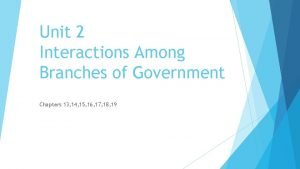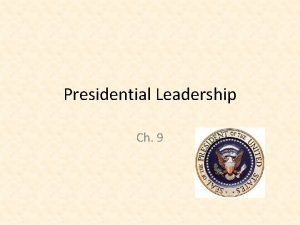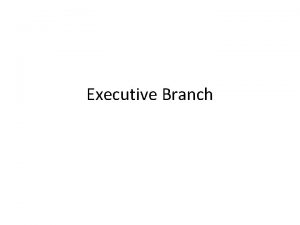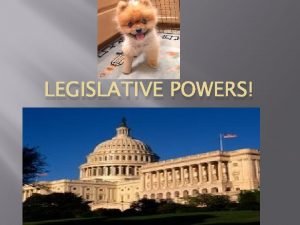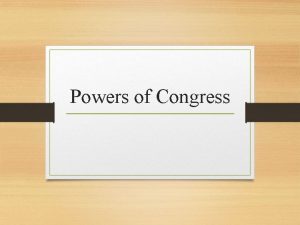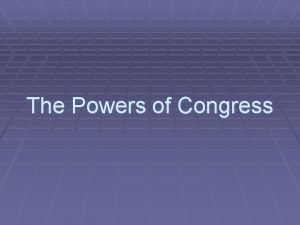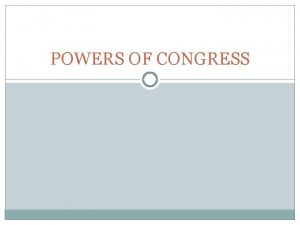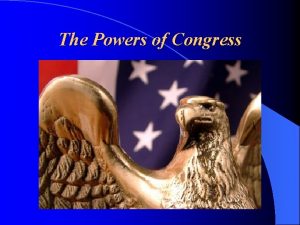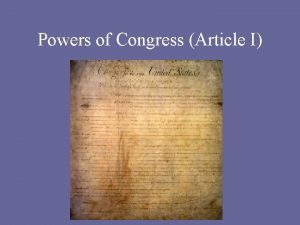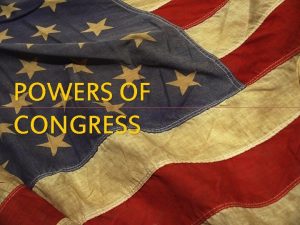Government Chapter 5 Section 3 Powers of Congress












- Slides: 12

Government Chapter 5 Section 3: Powers of Congress

Expressed Powers • Powers specifically granted to the federal government. • Give Congress the right to make laws in five main areas: government finance, regulation of commerce, national defense, law enforcement, and national sovereignty. • The majority of these can be found in Article 1, Section 8, of the Constitution.

Special Powers • Impeaching Officials • The charges against an accused official must be drawn up in the House of Representatives. • If a majority of repetitive votes to pursue the charges, the official is impeached, or formally accused. • The procedure of drawing up and passing the charges against the accused in the House is called impeachment.

Ratifying Treaties • A treaty that is not approved by a two-thirds vote in the Senate does not become a law.

Approving Appointments • The Senate has the right to reject all major appointments made by the president, including Supreme Court Justices, ambassadors, and cabinet members.

Deciding Elections • Congress holds the power to decide presidential elections under certain circumstances. • If no candidate for president receives a majority of electoral votes, the House of Representatives must choose the winner from among the three candidates receiving the most votes. • The representatives of each state collectively have one vote to cast, for a total of 50 votes.

• The Senate may also choose the vice president. • Each Senator has one vote, for a total of 100.

• The House has used it electoral power twice. • It choose Thomas Jefferson as president in 1801 and John Quincy Adams in 1825. • The Senate has used its electoral power only once- to choose Richard M. Johnson as vice president in 1837.

Implied Powers • The Constitution states that Congress has the power to make all laws which shall be necessary and proper for carrying into execution the foregoing powers specifically granted to it.

• The Elastic Clause has allowed Congress to expand its powers significantly.

Limits on Powers • The Supreme Court can use the power of judicial review to determine when Congress has reached beyond the powers granted to it. • The 10 th Amendment declares that the states or the people shall keep all the powers not specifically granted to the national government.

• Article 1, Section 9 of the Constitution further restricts the powers of Congress. • Ex post facto law- a law that applies to an action that took place before the law was passed. • Bill of attainder- a law that punishes a person who has not been convicted in a court of law. • Writ of habeas corpus (you may have the body) - a court order requiring police to bring all persons accused of a crime to court and to show sufficient reason to keep them in jail.
 Chapter 11 powers of congress
Chapter 11 powers of congress Interactions among branches of government
Interactions among branches of government Non legislative duties of congress
Non legislative duties of congress What are the informal sources of presidential power?
What are the informal sources of presidential power? Non legislative powers of congress
Non legislative powers of congress 4 powers of congress
4 powers of congress Informal checks on the president
Informal checks on the president Non legislative powers of congress
Non legislative powers of congress Expressed vs implied powers
Expressed vs implied powers What is a formal power of the president
What is a formal power of the president Congress informal powers
Congress informal powers Congressional powers
Congressional powers 4 powers of congress
4 powers of congress

